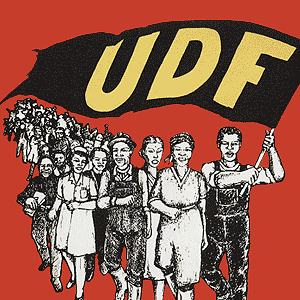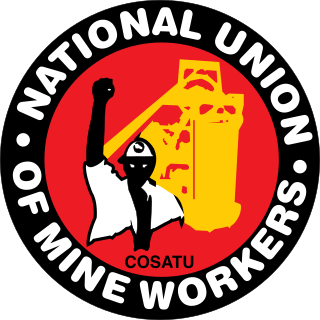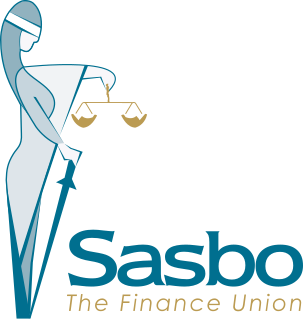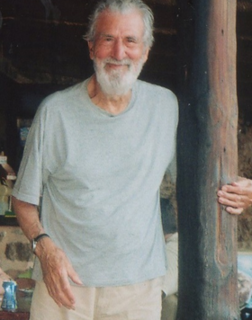Related Research Articles

The Congress of South African Trade Unions (COSATU) is a trade union federation in South Africa. It was founded in 1985 and is the largest of the country's three main trade union federations, with 21 affiliated trade unions.

The United Democratic Front (UDF) linked hundreds of popular organisations together in the struggle against apartheid. The non-racial coalition of about 400 civic, church, students', workers' and other organisations was formed in 1983, initially to fight the new Tricameral Parliament. The UDF's goal was to establish a "non-racial, united South Africa in which segregation is abolished and in which society is freed from institutional and systematic racism." Its slogan was "UDF Unites, Apartheid Divides."

The National Union of Mineworkers (NUM) is a trade union in South Africa. With a membership of 300,000 it is the largest affiliate of the Congress of South African Trade Unions.

SASBO – The Finance Union is a trade union in South Africa. It was founded in 1916 and has a membership of 70,000.

The National Council of Trade Unions (NACTU) is a national trade union center in South Africa.
Trade unions in South Africa has a history dating back to the 1880s. From the beginning unions could be viewed as a reflection of the racial disunity of the country, with the earliest unions being predominantly for white workers. Through the turbulent years of 1948–1991 trade unions played an important part in developing political and economic resistance, and eventually were one of the driving forces in realising the transition to an inclusive democratic government.

The Federation of South African Trade Unions (FOSATU) was a trade union federation in South Africa.

Internal resistance to apartheid in South Africa originated from several independent sectors of South African society and took forms ranging from social movements and passive resistance to guerrilla warfare. Mass action against the ruling National Party (NP) government, coupled with South Africa's growing international isolation and economic sanctions, were instrumental in leading to negotiations to end apartheid, which began formally in 1990 and ended with South Africa's first multiracial elections under a universal franchise in 1994.

Vic Allen was a British communist, human rights activist, political prisoner, sociologist, historian, economist and emeritus professor at the University of Leeds who worked closely with British trade unions, and was considered a key player in the resistance against Apartheid in South African. He was also known for being a key activist within the Communist Party of Great Britain (CPGB), and for spending his life supporting the South African National Union of Mineworkers (NUM).
The Trade Union Council of South Africa (TUCSA) was national trade union federation in South Africa.
The Amalgamated Engineering Union of South Africa (AEU) was a trade union representing white manufacturing workers in South Africa.

The Paper, Wood and Allied Workers' Union (PWAWU) was a trade union representing workers in various related industries in South Africa.
The South African Confederation of Labour (SACOL) was a national trade union federation of white workers in South Africa.
The National Federation of Workers (NFW) was a national trade union federation in South Africa.
The Urban Training Project (UTP) was an initiative to encourage black workers in South Africa to form new trade unions.
The South African Trades and Labour Council (SAT&LC) was a national trade union federation in South Africa.
The South African Federation of Trade Unions (SAFTU) was a national trade union federation of workers representing workers in South Africa.
The Building, Construction and Allied Workers' Union (BCAWU) is a trade union representing workers in the construction industry in South Africa.
The South African Equity Workers' Association (SAEWA) is a general union in South Africa.
The Hospitality Industry and Allied Workers' Union (HIAWU) is a trade union representing workers in the hospitality sector in South Africa.
References
- 1 2 3 Miller, Shirley (1982). Trade Unions in South Africa 1970-1980: a directory and statistics. Cape Town: Southern Africa Labour and Development Research Unit. ISBN 0799204692.
- ↑ The road to democracy in South Africa (PDF). South African Democracy Education Trust. 2006. Retrieved 13 March 2021.
- 1 2 Ncube, Don (1985). Black trade unions in South Africa. Braamfontein: Skotaville. pp. 130–135. ISBN 0947009051.
- 1 2 Kunnie, Julian (2018). Is Apartheid Really Dead? Pan Africanist Working Class Cultural Critical Perspectives. Routledge. ISBN 978-0429979231.
- ↑ "Council of Unions of South Africa (CUSA) is formed". History of South Africa Online. Retrieved 15 March 2021.